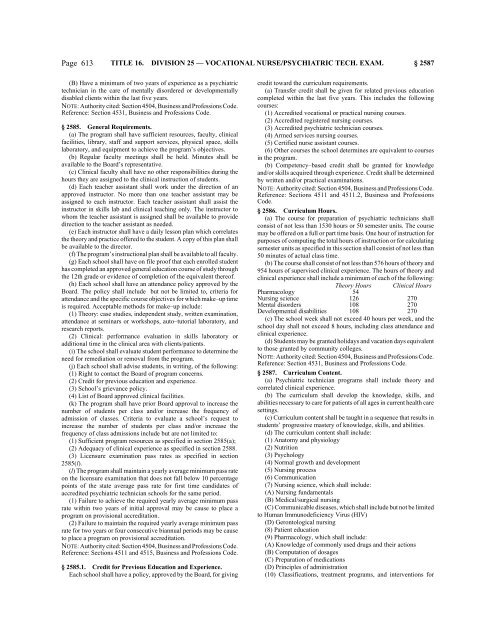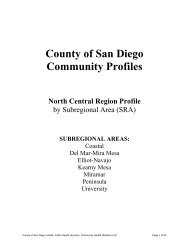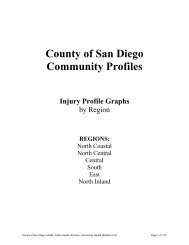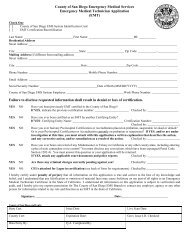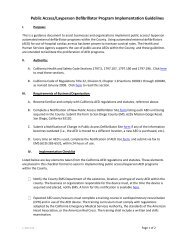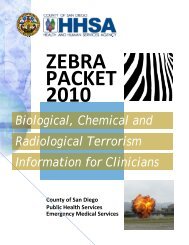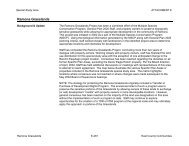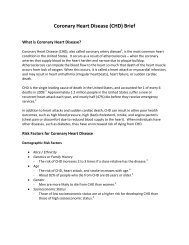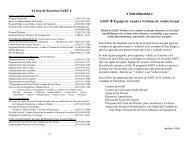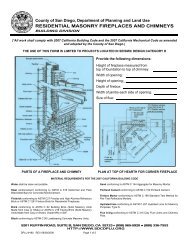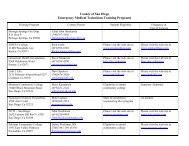CALIFORNIA CODE OF REGULATIONS - State of California
CALIFORNIA CODE OF REGULATIONS - State of California
CALIFORNIA CODE OF REGULATIONS - State of California
You also want an ePaper? Increase the reach of your titles
YUMPU automatically turns print PDFs into web optimized ePapers that Google loves.
Page 613<br />
TITLE 16. DIVISION 25 — VOCATIONAL NURSE/PSYCHIATRIC TECH. EXAM. § 2587<br />
(B) Have a minimum <strong>of</strong> two years <strong>of</strong> experience as a psychiatric<br />
technician in the care <strong>of</strong> mentally disordered or developmentally<br />
disabled clients within the last five years.<br />
NOTE: Authority cited: Section 4504, Business and Pr<strong>of</strong>essions Code.<br />
Reference: Section 4531, Business and Pr<strong>of</strong>essions Code.<br />
§ 2585. General Requirements.<br />
(a) The program shall have sufficient resources, faculty, clinical<br />
facilities, library, staff and support services, physical space, skills<br />
laboratory, and equipment to achieve the program’s objectives.<br />
(b) Regular faculty meetings shall be held. Minutes shall be<br />
available to the Board’s representative.<br />
(c) Clinical faculty shall have no other responsibilities during the<br />
hours they are assigned to the clinical instruction <strong>of</strong> students.<br />
(d) Each teacher assistant shall work under the direction <strong>of</strong> an<br />
approved instructor. No more than one teacher assistant may be<br />
assigned to each instructor. Each teacher assistant shall assist the<br />
instructor in skills lab and clinical teaching only. The instructor to<br />
whom the teacher assistant is assigned shall be available to provide<br />
direction to the teacher assistant as needed.<br />
(e) Each instructor shall have a daily lesson plan which correlates<br />
the theory and practice <strong>of</strong>fered to the student. A copy <strong>of</strong> this plan shall<br />
be available to the director.<br />
(f) The program’s instructional plan shall be available to all faculty.<br />
(g) Each school shall have on file pro<strong>of</strong> that each enrolled student<br />
has completed an approved general education course <strong>of</strong> study through<br />
the 12th grade or evidence <strong>of</strong> completion <strong>of</strong> the equivalent there<strong>of</strong>.<br />
(h) Each school shall have an attendance policy approved by the<br />
Board. The policy shall include but not be limited to, criteria for<br />
attendance and the specific course objectives for which make–up time<br />
is required. Acceptable methods for make–up include:<br />
(1) Theory: case studies, independent study, written examination,<br />
attendance at seminars or workshops, auto–tutorial laboratory, and<br />
research reports.<br />
(2) Clinical: performance evaluation in skills laboratory or<br />
additional time in the clinical area with clients/patients.<br />
(i) The school shall evaluate student performance to determine the<br />
need for remediation or removal from the program.<br />
(j) Each school shall advise students, in writing, <strong>of</strong> the following:<br />
(1) Right to contact the Board <strong>of</strong> program concerns.<br />
(2) Credit for previous education and experience.<br />
(3) School’s grievance policy.<br />
(4) List <strong>of</strong> Board approved clinical facilities.<br />
(k) The program shall have prior Board approval to increase the<br />
number <strong>of</strong> students per class and/or increase the frequency <strong>of</strong><br />
admission <strong>of</strong> classes. Criteria to evaluate a school’s request to<br />
increase the number <strong>of</strong> students per class and/or increase the<br />
frequency <strong>of</strong> class admissions include but are not limited to:<br />
(1) Sufficient program resources as specified in section 2585(a);<br />
(2) Adequacy <strong>of</strong> clinical experience as specified in section 2588.<br />
(3) Licensure examination pass rates as specified in section<br />
2585(l).<br />
(l) The program shall maintain a yearly average minimum pass rate<br />
on the licensure examination that does not fall below 10 percentage<br />
points <strong>of</strong> the state average pass rate for first time candidates <strong>of</strong><br />
accredited psychiatric technician schools for the same period.<br />
(1) Failure to achieve the required yearly average minimum pass<br />
rate within two years <strong>of</strong> initial approval may be cause to place a<br />
program on provisional accreditation.<br />
(2) Failure to maintain the required yearly average minimum pass<br />
rate for two years or four consecutive biannual periods may be cause<br />
to place a program on provisional accreditation.<br />
NOTE: Authority cited: Section 4504, Business and Pr<strong>of</strong>essions Code.<br />
Reference: Sections 4511 and 4515, Business and Pr<strong>of</strong>essions Code.<br />
§ 2585.1. Credit for Previous Education and Experience.<br />
Each school shall have a policy, approved by the Board, for giving<br />
credit toward the curriculum requirements.<br />
(a) Transfer credit shall be given for related previous education<br />
completed within the last five years. This includes the following<br />
courses:<br />
(1) Accredited vocational or practical nursing courses.<br />
(2) Accredited registered nursing courses.<br />
(3) Accredited psychiatric technician courses.<br />
(4) Armed services nursing courses.<br />
(5) Certified nurse assistant courses.<br />
(6) Other courses the school determines are equivalent to courses<br />
in the program.<br />
(b) Competency–based credit shall be granted for knowledge<br />
and/or skills acquired through experience. Credit shall be determined<br />
by written and/or practical examinations.<br />
NOTE: Authority cited: Section 4504, Business and Pr<strong>of</strong>essions Code.<br />
Reference: Sections 4511 and 4511.2, Business and Pr<strong>of</strong>essions<br />
Code.<br />
§ 2586. Curriculum Hours.<br />
(a) The course for preparation <strong>of</strong> psychiatric technicians shall<br />
consist <strong>of</strong> not less than 1530 hours or 50 semester units. The course<br />
may be <strong>of</strong>fered on a full or part time basis. One hour <strong>of</strong> instruction for<br />
purposes <strong>of</strong> computing the total hours <strong>of</strong> instruction or for calculating<br />
semester units as specified in this section shall consist <strong>of</strong> not less than<br />
50 minutes <strong>of</strong> actual class time.<br />
(b) The course shall consist <strong>of</strong> not less than 576 hours <strong>of</strong> theory and<br />
954 hours <strong>of</strong> supervised clinical experience. The hours <strong>of</strong> theory and<br />
clinical experience shall include a minimum <strong>of</strong> each <strong>of</strong> the following:<br />
Theory Hours Clinical Hours<br />
Pharmacology 54<br />
Nursing science 126 270<br />
Mental disorders 108 270<br />
Developmental disabilities 108 270<br />
(c) The school week shall not exceed 40 hours per week, and the<br />
school day shall not exceed 8 hours, including class attendance and<br />
clinical experience.<br />
(d) Students may be granted holidays and vacation days equivalent<br />
to those granted by community colleges.<br />
NOTE: Authority cited: Section 4504, Business and Pr<strong>of</strong>essions Code.<br />
Reference: Section 4531, Business and Pr<strong>of</strong>essions Code.<br />
§ 2587. Curriculum Content.<br />
(a) Psychiatric technician programs shall include theory and<br />
correlated clinical experience.<br />
(b) The curriculum shall develop the knowledge, skills, and<br />
abilities necessary to care for patients <strong>of</strong> all ages in current health care<br />
settings.<br />
(c) Curriculum content shall be taught in a sequence that results in<br />
students’ progressive mastery <strong>of</strong> knowledge, skills, and abilities.<br />
(d) The curriculum content shall include:<br />
(1) Anatomy and physiology<br />
(2) Nutrition<br />
(3) Psychology<br />
(4) Normal growth and development<br />
(5) Nursing process<br />
(6) Communication<br />
(7) Nursing science, which shall include:<br />
(A) Nursing fundamentals<br />
(B) Medical/surgical nursing<br />
(C) Communicable diseases, which shall include but not be limited<br />
to Human Immunodeficiency Virus (HIV)<br />
(D) Gerontological nursing<br />
(8) Patient education<br />
(9) Pharmacology, which shall include:<br />
(A) Knowledge <strong>of</strong> commonly used drugs and their actions<br />
(B) Computation <strong>of</strong> dosages<br />
(C) Preparation <strong>of</strong> medications<br />
(D) Principles <strong>of</strong> administration<br />
(10) Classifications, treatment programs, and interventions for


